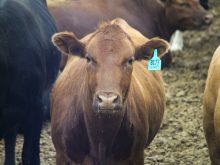McDonald’s Corp. said Feb. 13 it will work with its U.S. pork suppliers to phase out the use of gestation crates, the cramped stalls that millions of mother sows are confined to while they raise piglets.
The fast-food chain said the metal crates were “not a sustainable production system for the future.” It said it would work with suppliers to hammer out a timeline for the phase-out and would talk about the planned next steps in May.
“There are alternatives that we think are better for the welfare of sows,” Dan Gorsky, senior vice-president for supply chain management for McDonald’s North America, said in a statement.
Read Also

Farming Smarter receives financial boost from Alberta government for potato research
Farming Smarter near Lethbridge got a boost to its research equipment, thanks to the Alberta government’s increase in funding for research associations.
McDonald’s joins a growing list of food producers and retailers, including Smithfield Foods, Hormel, Cargill, Burger King and Wolfgang Puck, that have promised to move away from pork bred from sows confined to the crates, which are typically too narrow to allow the sows to turn around.
Wayne Pacelle, the president and chief executive officer of the Humane Society of the United States, predicted the announcement would have a “catalytic” impact on holdouts.
“They’re clearly the biggest pork buyer in the fast-food sector and the largest restaurant chain in the world,” Pacelle said. “So this will certainly have seismic effect within the pork industry.”
McDonald’s uses ham, sausage and bacon in its breakfast menu.
The National Pork Board, a trade group representing the pork industry, released a statement defending the stalls as a “conventional” practice. It said that alternatives, including open pens, free-access stalls and pastures, have “welfare advantages and disadvantages that must be considered by an individual farmer.”
Sows are often confined in the crates from just before the birth of the piglets until they are weaned months later. Defenders of the practice said that it minimizes the number of tiny piglets crushed by the huge sows in the first days of life. Opponents said it is cruel to keep the mothers so confined for weeks at a time.
The Humane Society said 70 per cent of the pork industry confines its pregnant pigs to gestation crates, which are banned in the European Union and eight U.S. states, including California, Ohio and Michigan.














